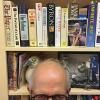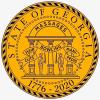Pub Notes
Sunshine of a Happy Life
One evening as a freshman at the university, I espied my English teacher, Dr. Tom Waller, enjoying a Budweiser with his hamburger steak at Poss’ Drive-In, the popular Atlanta Highway joint. My social values had been formed by the Methodist Church, and I was taken aback to see this other side of Dr. Waller: drinking—in public. The revelation that Dr. Waller apparently enjoyed a life of his own outside the classroom was difficult for me to grasp.
English professors sometimes get a bad rap, maybe because some of them do get a bit pushy with their book learning. But the best ones attain a kind of zen balance between knowing and teaching; they instruct through their presence, through their love of life, because their subject is all of life, as refracted through literature. Let me try that again. The best ones aren’t teaching books, they’re teaching life, and of course it helps if they know their subject.
Another of our English professor friends died last week. George Marshall had been retired a long time, and he was 90 years old and still had his wit about him. He, too, had a life outside the classroom (and he was masterful inside it, from all reports.)
George Marshall knew about living, because he plunged into it as a young boy and didn’t stop relishing the activity and people around him until his own full life came to an end. He had a sunny, gregarious nature; he loved to be where people were together, doing things. At the same time he had the discipline to do his academic work, to earn his doctorate and pursue scholarship along with his teaching. He also involved himself in his community, becoming a stalwart in efforts to preserve our built heritage and to help us understand who we are and whence we came. Moreover, he was active within academia, working for the basic support of those who do the work, helping to secure for his colleagues the retirement benefits that are as important as the salary.
George Marshall had a life within the classroom and outside it, with a two-way flow between his studies and his many other interests; his experience informed his teaching, and his learning provided the examination that made life worth living.
He had humor, presence and substance; he was immersed in life, even when physical debility slowed him down. He participated enthusiastically as his amanuensis, his wife Charlotte Thomas Marshall, grew in stature to become a meticulous and eminently readable local historian while he supported her with his superb editing and proofreading skills.
Fortunately, George Marshall left us a couple of autobiographical volumes that help us understand who he was and how he got that way. In these books he also shows us how to wield the written word like a surveying instrument, laying down precise lines in order for us to get the picture. The Sunshine of My Happy Youth tells us about his boyhood enthusiasms, and My World War II is a collection of letters he wrote home from the combat zone in Europe, demonstrating that even right out of college, he was a clear-eyed observer and lively storyteller. These books are no doubt available in both the UGA and the ACC libraries, and they make accessible to us the experiences of a fellow Georgian who “saw life clearly and saw it whole.” What is not in the libraries is a monograph George wrote about the three years he was a tuberculosis patient after the war, when his life was put on hold, his engagement dissolved, his career evaporated and his life was circumscribed to a bed in a TB ward, from which he was not expected to emerge. He did get out, with the redoubled zest for life that helped make him the marvelous man we mourn.
Sadly, at just about the same time we learned of George’s death came word that we had also lost Mary Anne Hodgson, another of our Athenians committed to preserving and illuminating the shards of our history that help us piece together the coherence of our community. Mary Anne was intelligent, charming and beautiful, and she was a heroine to her family and a credit to her town.
George Marshall and Mary Anne Hodgson are now a part of the history they so greatly valued. Their lives remind us that our own are also enhanced when we embrace knowledge, friendship, family and community.
More by Pete McCommons
-
Voting Absentee: Necessary But Not Easy
Pub Notes
-

Be Ready When National TV Comes Calling
Pub Notes
-










comments